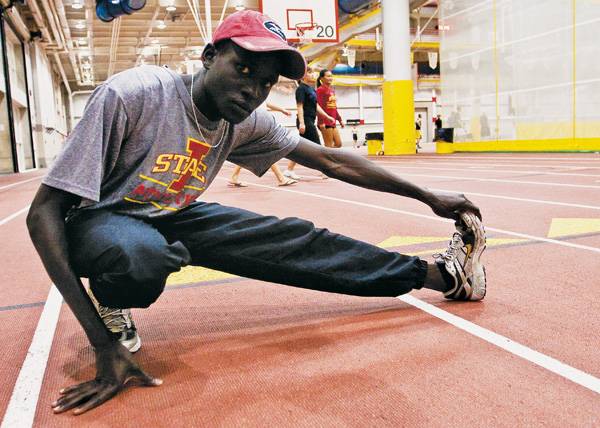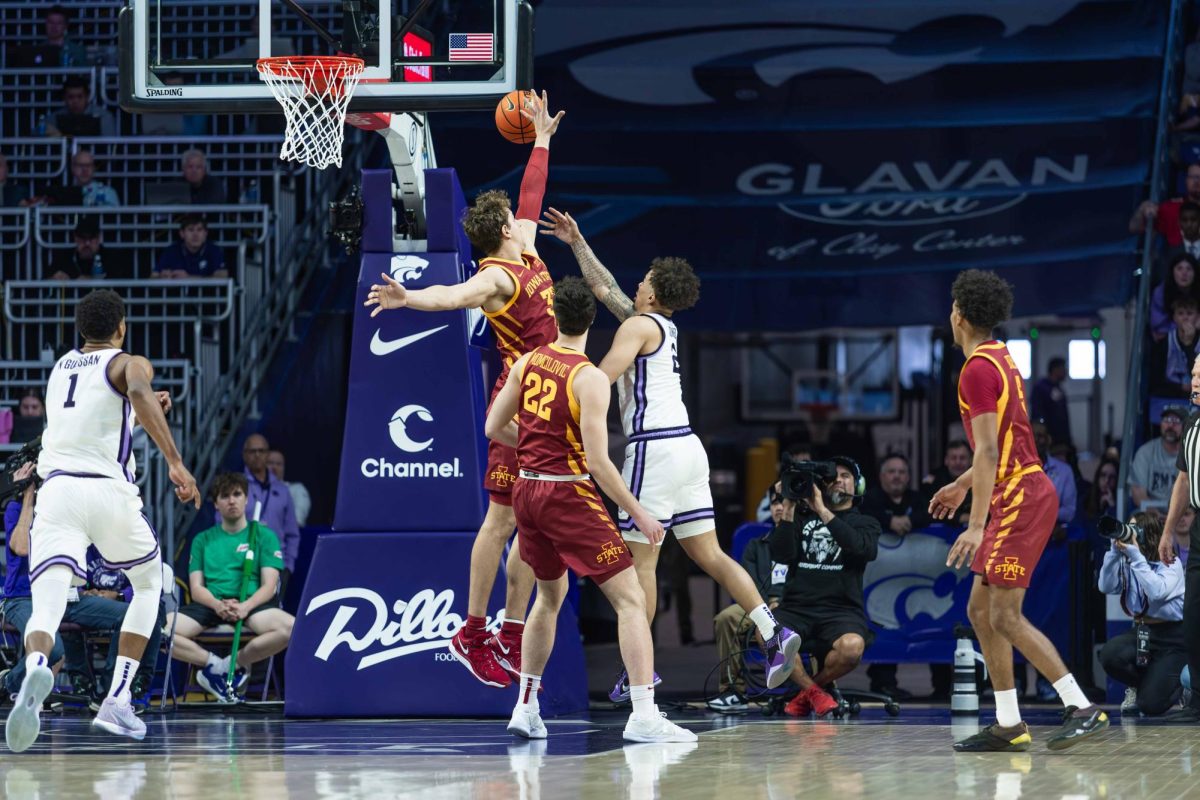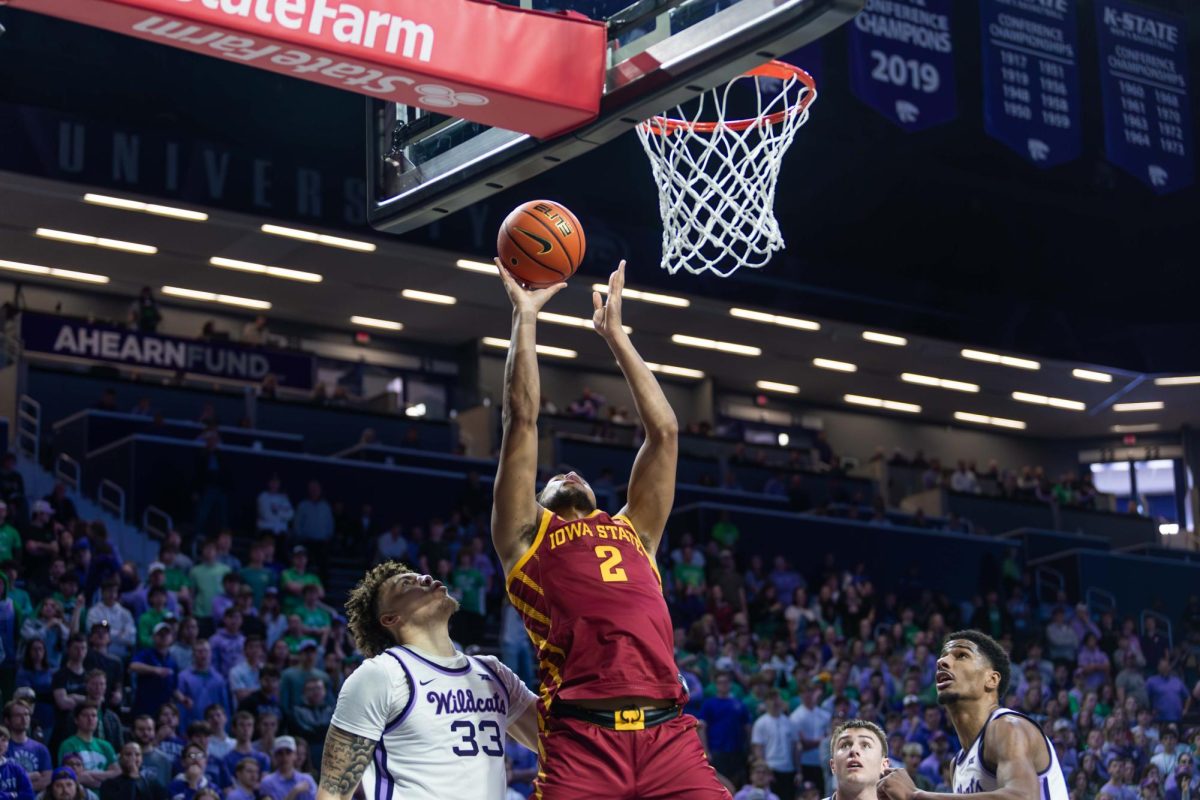CROSS COUNTRY: Running from the past

Guor Marial, cross country distance runner, stretches at Lied Recreation Athletic Center on Monday. The Sudan native came to the U.S. with his aunt and uncle after they were attacked by Sudanese police because of allegations that his uncle sympathized with a Christian rebel group. Photo: Jay Bai/Iowa State Daily
November 2, 2009
By Jake Calhoun
Daily Staff Writer
Ten years have passed since Guor Marial was struck with a blow to the head by the butt of a Sudanese policeman’s rifle after being awoken by the intrusive officers at one o’clock in the morning.
“They broke my jaw,” Marial said. “It still hurts sometimes. Even when I bend [my head] down or look down, I get a headache and it gets sore a lot. If I run too hard or something, sometimes I feel [the pain of my jaw].”
Marial, now a senior, has proved himself worthy of being one of the Cyclones’ elite athletes in the sport of cross country and is one of the main catalysts for putting ISU cross country on the map.
In 2008, Marial earned All-American honors when he finished 38th overall at the NCAA Championships.
For Marial, running a grueling 10,000-meter race is quite different than his experiences before his arrival to the United States.
When he was just 14 years old, Marial witnessed the civil unrest of his homeland of Sudan — a nation torn between the Muslim government of the North and the Christians and “Non-Arabs” of the South.
According to Ellen Pirro, lecturer of political science at Iowa State, one of the key contributing factors to the civil war of Sudan was the discovery of oil in the southern part of the country. The Muslim government of the north then tried to lay claim to the oil and use it to its advantage, adding fuel to the fire of already–towering tensions between the Muslims and the Christians.
The Muslims openly discriminated against Sudanese Christians because of their differing religious beliefs, while limiting opportunities for Christians to get good jobs or a good education.
“It’s an Islamic government, and they have, at various times, tried to impose Islam on residents in the South,” Pirro said. “It’s been a very long, bloody, protracted conflict.”
This oppression made life difficult for Marial and his aunt and uncle, who were Christians from the South.
“I was Sudanese there, but at [the] same time, I wasn’t getting the full rights as Sudanese. So moving from South to North, I felt like I was treated like a refugee. I was a refugee in my own country,” Marial said. “The only thing that was helping us, to give us water or to give us food and medication, was the Red Cross. Other than that, people would die because [some people were] literally being moved away from the city [of Khartoum] to be shipped and left in the desert. No water, no food.”
Marial’s uncle worked as a translator for the Red Cross, an organization whose operations were terminated by the Sudanese government for not being a government-operated program.
“[My uncle] would get up every morning and check on people and give the medication to patients,” Marial said. “The U.N. sent him with a group and he went from town to town to help the people and take care of them and make sure the water is clear and clean.”
When asked about different organizations such as the Red Cross and United Nations, Marial simply stated, “I wouldn’t be living or have survived there without them.”
The night Marial and his aunt were brutally beaten by intruding Sudanese police, his uncle was arrested and apprehended for allegedly sympathizing and collaborating with the Sudan Peoples Liberation Army (SPLA), a rebel group of Southern Christians who used violence to combat the oppressive Muslim government of the North.
Marial’s uncle was taken along with other prisoners out to the desert to be killed in an execution-style firing line.
When the firing started, Marial’s uncle was the first to drop to the ground while the other bodies fell on top of him.
Once the executioners left, he got up, successfully convincing them he had been killed. He then managed to unchain himself and escape to Khartoum, where he then proceeded to travel to Egypt to reunite with Marial and his aunt seven months later.
After the intrusion incident in Sudan, Marial and his aunt immediately left Sudan for Egypt, where they received medical care with the help of church groups and the U.N. It was there that Marial spent two months with his jaw wired shut in order for it to heal completely. His aunt successfully managed to recover from a broken pelvis and collarbone she had suffered from her beating.
Marial has not been back to Sudan since the night of the intrusion incident.
Marial was one of 10 children in his family, all of whom — except he and his brother — have died.
“It’s painful, it’s not easy to lose a sibling,” Marial said. “That’s one of the things that impacts the rest of your life.”
Marial declined to go into further detail about his siblings for fear that doing so would bring back painful memories of them.
“I can run, come to practice, go to class, but inside me that’s not what people see on [the] outside,” Marial said. “There’s a big thing I’m covering inside that drives me. It’s always impacted me. I lost my sibling[s], I lost my home.”
Marial continued. “Even losing the home and going to live in a different culture, and you leave your mom and your brother at the age of 8 years old is something, without even losing your sibling, is hard and painful,” he said. “Since ‘93, I haven’t seen my biological dad. It’s very stressful.”
Marial admits the events of his past and leaving his surviving family back in Sudan sometimes make it difficult for him to concentrate in school and athletics.
“It’s a thing I’ve been dealing with since high school and since I was in Egypt; it’s just been crazy,” Marial said. “You just got to sit down and relate yourself to some [other] people, because there are some people, too, that struggle in the same way you are. So it’s just a matter of being strong. There are a lot of people out there who can help. Without help, I wouldn’t be here [at] Iowa State. I wouldn’t even be alive, but it’s all about help. So with faith and staying positive, that’s the big thing.”
In July 2001, Marial moved with his aunt and uncle from Egypt to Concord, N.H., where he attended high school.
Coming out of high school, Marial was highly recruited as a distance runner by schools such as Kentucky, Connecticut, Colorado and Boston College. However, he says his main reason for coming to Iowa State from New Hampshire was cross country coach Corey Ihmels.
“[Coach Ihmels] was the best of all the coaches who were recruiting me because of his personality and his program,” Marial said. “He’s not only about who you are as [an] athlete, but he’s about who you are as [a] person. He cares on both sides [of] academic and running. He’s more willing to work with you to succeed in academics and running at same time. That’s what makes him unique.”
Ever since Ihmels first came in contact with Marial, he knew Marial would make a big impact for ISU cross country.
“Guor has been an influential member of the team since he set foot on campus,” Ihmels said. “He overcame a lot of obstacles to get here academically and athletically, and he’s worked really hard day-in and day-out to be successful. I don’t know if I’ve had anyone on the team who works as hard academically as he has. We go on a bus ride and he’s got his book out 24/7; he’s always on top of things and I just think he’s a great ambassador as a student-athlete. He’s someone we’re going to miss sorely next year when he’s gone.”
In 2005, the North and South signed a peace agreement that would end the 21-year conflict in Sudan. However, the civil unrest has yet to cease completely.
“There is still a lot of stuff going on,” Marial said. “That peace agreement was between the South and the North, but there was still war going on in the Darfur region as well as the South. There [are] still a lot of issues going on there.”
Although Marial has flourished in his new life in America in both academics and athletics, he hopes to one day return to Sudan to give back to the place he holds as “home” in his heart.
“My main goal is to help people. That’s the reason I’m running in college and working [as] hard as possible to get the academic [opportunity] I could get here and help those young kids [of Sudan],” Marial said. “Those young kids are relying on people like me who are in the U.S. to get an education. They are looking up to us and they are waiting for us be able to help them.
“In my hometown, there are a lot of young kids who have never seen me before who were born after I left, but they hold my name and they are hoping for me one day to come and help them. And those are the kinds of things I want to do: To be able to help them.”






